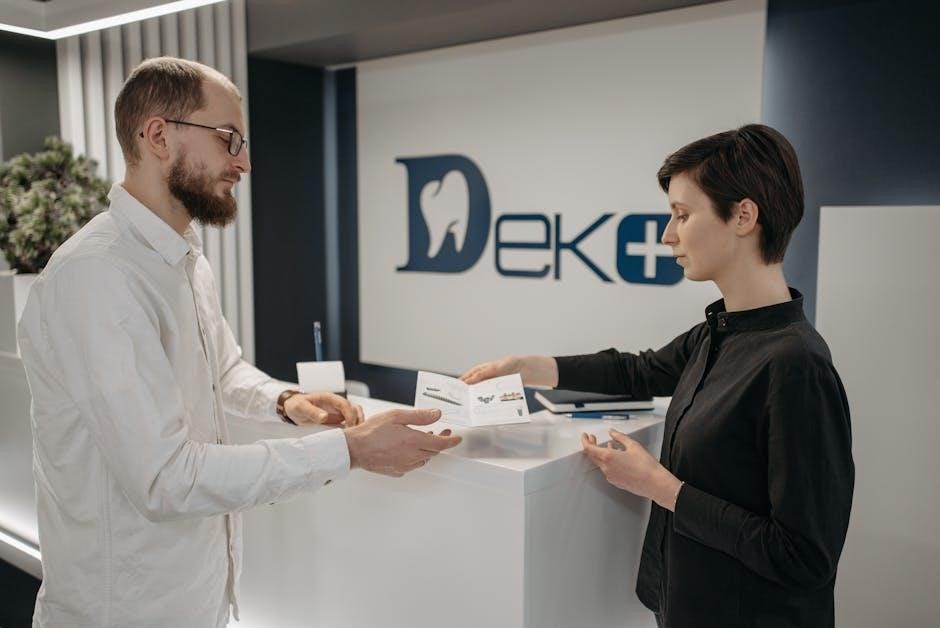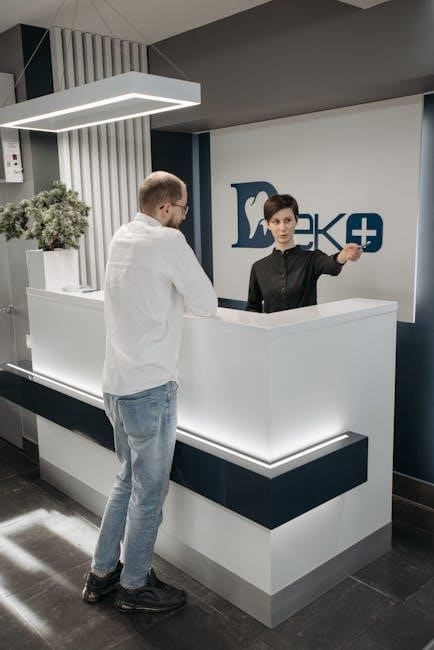
This manual provides comprehensive guidance for dental front desk staff, covering essential duties, patient interaction, and operational efficiency․ It serves as a vital resource for both new and experienced team members․
Key Responsibilities of Dental Front Desk Staff
Dental front desk staff manage patient communication, appointment scheduling, insurance processing, and financial transactions․ Their role ensures smooth office operations, patient satisfaction, and efficient workflow coordination․
2․1․ Patient Communication and Relationship Management
Patient communication is the cornerstone of dental front desk responsibilities․ Effective interaction ensures a positive experience, builds trust, and fosters long-term relationships․ Front desk staff must master active listening, empathy, and clear articulation to address patient concerns․ Professionalism in tone and demeanor is crucial, whether in-person or over the phone․ They should maintain confidentiality and adapt communication styles to suit diverse patient needs․ Managing patient expectations and providing accurate information about treatments and procedures is essential․ Building rapport through personalized interactions enhances patient satisfaction and loyalty․ Additionally, handling difficult situations with tact and resolving conflicts diplomatically are key skills․ Regular follow-ups and reminders demonstrate care and attention to detail, reinforcing the practice’s commitment to patient-centric care․ By excelling in communication, front desk staff play a vital role in creating a welcoming and supportive environment for patients․
2․2․ Appointment Scheduling and Management
Efficient appointment scheduling is a critical function of dental front desk staff․ It involves coordinating patient visits, managing time slots, and ensuring a smooth workflow for both patients and dental teams․ Staff must skillfully balance patient preferences with practice availability, minimizing wait times and avoiding overbooking․ Accurate recording of appointments in dental software is essential to prevent errors․ Handling cancellations, rescheduling, and no-shows requires diplomacy and organization to maintain patient trust and optimize the practice’s schedule․ Verifying patient demographics and insurance details before appointments ensures a seamless check-in process․ Reminders, whether via phone, email, or text, are vital for reducing no-shows and enhancing patient responsibility․ Effective appointment management not only improves operational efficiency but also enhances patient satisfaction and loyalty; By mastering these tasks, front desk staff contribute significantly to the practice’s success and patient care quality․
2․3․ Insurance Handling and Financial Management
Effective insurance handling and financial management are cornerstone responsibilities for dental front desk staff․ This includes verifying patient insurance coverage, capturing images of insurance cards and IDs, and uploading them to patient charts․ Staff must review financial policies with patients, ensuring clarity on payment responsibilities and collecting necessary fees․ Handling insurance claims, verifying benefits, and explaining payment options are critical tasks․ Front desk teams must also manage patient accounts, process payments, and maintain accurate financial records․ Clear communication about treatment costs and insurance coverage helps build patient trust․ Utilizing dental software for insurance verification and claims submission streamlines processes․ Ensuring compliance with financial policies and maintaining patient confidentiality are essential․ Efficient financial management enhances practice profitability and patient satisfaction, making it a vital component of front desk operations․
Essential Skills for Dental Front Desk Success

Proficiency in dental software, strong organizational skills, and excellent patient communication are vital․ Time management, attention to detail, and professionalism ensure seamless operations and patient satisfaction․

3․1․ Professionalism and Patient Interaction
Maintaining professionalism is critical for a positive patient experience․ Dental front desk staff should always present themselves with a friendly demeanor, ensuring patient comfort and trust․ Effective communication involves active listening, clear explanations, and empathy․ Handling patient inquiries, concerns, and feedback with tact and professionalism fosters loyalty and satisfaction․ Additionally, being knowledgeable about dental procedures and insurance policies allows staff to address questions confidently․ Consistency in greeting patients, managing phone calls, and resolving issues reflects the office’s commitment to quality care․ By prioritizing patient interaction, front desk staff create a welcoming environment that supports the overall success of the dental practice․

3․2․ Organizational and Time Management Skills
Effective organizational and time management skills are essential for dental front desk success․ Staff must efficiently juggle multiple tasks, such as scheduling appointments, managing patient records, and handling financial transactions․ Prioritizing tasks ensures smooth operations, while minimizing distractions helps maintain focus․ Utilizing calendars, to-do lists, and digital tools enhances productivity and reduces errors․ Properly organizing patient files and maintaining a clutter-free workspace also supports efficiency․ Time management involves balancing administrative duties with patient interactions, ensuring seamless flow throughout the day․ By staying organized and managing time wisely, front desk staff can contribute to a well-run dental office, enhancing both patient satisfaction and team performance․

3;3․ Technical Proficiency with Dental Software
Technical proficiency with dental software is a cornerstone of modern dental front desk operations․ Staff must master systems like patient management platforms, scheduling tools, and billing software; These technologies streamline tasks such as appointment scheduling, insurance claims processing, and financial management․ Familiarity with features like digital patient records, automated reminders, and real-time reporting ensures efficient workflow․ Training programs often emphasize hands-on practice with these tools to build confidence and competency․ Regular updates and ongoing education are crucial as software evolves․ Proficiency in dental software not only enhances operational efficiency but also improves patient satisfaction by reducing wait times and errors․ As technology advances, staying adept with the latest tools is vital for maintaining a competitive edge in dental practice management․

The Training Process for Dental Front Desk Staff
The training process involves initial onboarding and ongoing education, focusing on software proficiency, patient communication, and operational efficiency․ It ensures staff are well-prepared to manage daily tasks effectively and maintain patient satisfaction․
4․1․ Initial Training and Onboarding

Initial training and onboarding are crucial for new dental front desk staff․ This phase introduces foundational skills such as patient communication, appointment scheduling, and insurance handling․ It also covers office-specific procedures, ensuring a smooth transition into the team․ The process typically includes shadowing experienced staff, reviewing the dental front desk training manual, and hands-on practice with dental software․ Effective onboarding helps new employees understand their roles and responsibilities, fostering confidence and competence from day one․ By the end of this phase, staff should be able to manage daily tasks efficiently, providing excellent patient care and maintaining office organization․
4․2; Ongoing Education and Development

Ongoing education and development are essential for dental front desk staff to stay updated with industry trends and office procedures․ Regular training sessions, workshops, and webinars can enhance skills in patient communication, insurance handling, and software proficiency․ Continuous learning ensures staff remain adept at managing appointments, handling financial transactions, and maintaining patient confidentiality․ Additionally, microlearning platforms offer flexible opportunities for staff to refine their knowledge at their own pace․ This approach fosters a culture of continuous improvement, ensuring the front desk team remains efficient and adaptable to evolving dental office needs․ By prioritizing ongoing education, practices can maintain high standards of patient care and operational excellence, ultimately contributing to the success of the dental office․

Best Practices for Effective Front Desk Management
Implementing efficient processes, maintaining clear communication, and ensuring patient satisfaction are key to effective front desk management․ Streamline patient intake, master phone etiquette, and prioritize confidentiality to enhance office operations․
5․1․ Streamlining Patient Intake Processes
Streamlining patient intake processes is essential for improving efficiency and patient satisfaction․ Start by implementing online forms to reduce paperwork and ensure all necessary information is collected beforehand․ Upon arrival, verify insurance details and capture images of insurance cards and IDs for accurate records․ Review the financial policy with patients and address any questions to avoid misunderstandings․ Collect patient responsibility payments upfront to minimize delays․ Ensure all consent forms and required documentation are completed digitally or in advance to save time during the visit․ Train staff to handle these tasks seamlessly, maintaining a smooth workflow․ Regularly update and organize patient records to ensure accessibility and compliance with regulations․ By optimizing these steps, the front desk can create a hassle-free experience for both patients and staff, enhancing overall office efficiency and patient satisfaction․
5․2․ Mastering Phone Communication Techniques

Mastering phone communication techniques is crucial for dental front desk staff to ensure effective patient interactions․ Always answer calls promptly and professionally, using a standardized greeting to create a positive first impression․ Be prepared to handle various inquiries, such as appointment scheduling, insurance verification, and treatment questions, with confidence and clarity․ Active listening is key to understanding patient needs and addressing concerns effectively․ When scheduling appointments, ensure accuracy and confirm all details before ending the call․ Maintain patient confidentiality by avoiding the disclosure of sensitive information over the phone․ Use dental software to efficiently manage call logs and patient records․ Follow up with patients post-appointment to gather feedback and confirm future visits․ Regular training on phone etiquette and communication skills can significantly enhance patient satisfaction and office efficiency․ By mastering these techniques, the front desk team can provide exceptional service and build strong patient relationships․
5․3․ Maintaining Patient Confidentiality and Compliance
Maintaining patient confidentiality and compliance is a critical responsibility for dental front desk staff․ All team members must adhere to HIPAA guidelines and ensure that patient information is protected from unauthorized access․ This includes securely storing physical and digital records, limiting access to authorized personnel, and avoiding discussions of patient details in public areas․ Staff should be trained to handle sensitive information discreetly and avoid sharing patient data over the phone or via email without proper consent․ Regular audits and training sessions can help reinforce compliance standards․ Additionally, front desk staff should be aware of state-specific regulations and ensure all necessary patient forms and consents are up to date․ By prioritizing confidentiality and compliance, the dental office can build trust with patients and avoid legal repercussions․ This commitment to privacy is essential for maintaining a professional and patient-centered environment․